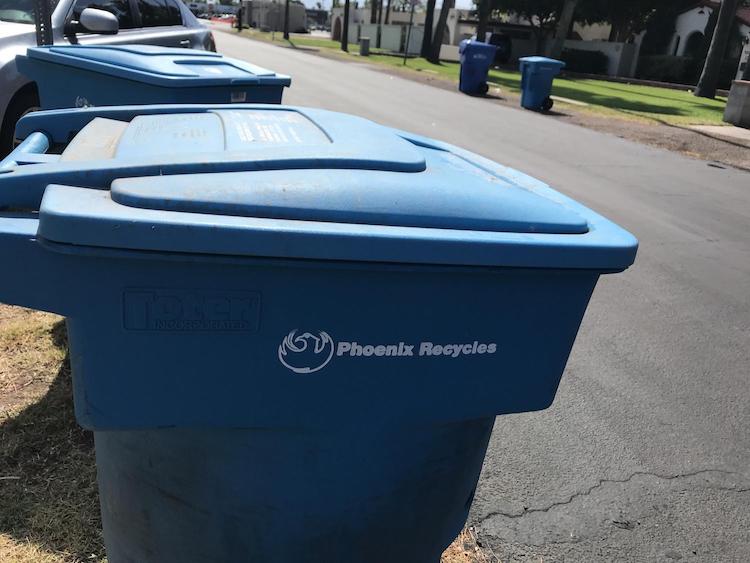- Home
- The Feature
- Phoenix Considering Ending Recycling and Yard Waste to Keep Trash Costs Down

Phoenix Considering Ending Recycling and Yard Waste to Keep Trash Costs Down
Disposing of trash, recyclables and yard waste is getting more expensive for Phoenix, and the city likely will have to start passing that cost onto customers or discontinue its recycling and compost programs altogether.
All single-family houses in Phoenix pay a $26.80 monthly fee, which includes weekly curbside trash and recycling pickup, in addition to bulk trash pickup four times a year and some other disposal services.
That rate has stayed the same for 10 years — but it’s no longer enough to cover the city’s trash services, Phoenix Public Works Director Ginger Spencer said.
To continue curbside trash pickup in Phoenix, the city will need to raise the rate by $4.75 per month per customer. If it wants to keep its recycling programs as well, the city will have to raise the rate by $6.40.
Phoenix’s Public Works Department will ask the City Council on Tuesday to weigh in on whether it wants to pursue a rate increase and, if so, which one.
According to a staff report, if the city does not increase the rate, the department will have to make $36.5 million in service cuts, including “every other week recycling, the elimination of bulk trash and household hazardous waste events, closing the compost facility and one of the City’s recycling facilities, removal of eco stations and the elimination of approximately 135 staff positions.”
If the council gives the go-ahead to pursue an increase, the increase will come before the council for a formal vote at the end of January.
“We’ve done everything we can to basically not have to ask for a rate increase, but unfortunately we’re here,” Spencer said.
The Public Works Department is proposing four rate-increase options, which would increase 2% each year to account for inflation:
Maintain current services ($33.20/month)
This would allow the city to continue weekly curbside trash and recycling pickup, in addition to its curbside green organics pilot program, which is available to about 150,000 residents for an additional $5 fee.
End green organics program ($32.45/month)
This would end the city’s curbside green organics program, which is available to about 150,000 residents for an additional $5 fee. It also would shut down the city’s compost facility, where residents can dispose of yard waste, like grass clippings.
Recycle every other week ($32.30/month)
This would continue the city’s recycling program but limit the curbside recycling pickup to every other week, which would cut back on the city’s transportation costs. Residents could request an extra recycling bin free of charge if they anticipate filling more than one bin every two weeks, Public Works Assistant Director Joe Giudice said.
End recycling and green organics program ($31.55/month)
This rate increase would end both the recycling and green organics programs.
Phoenix began an initiative several years ago to increase the city’s waste diversion rate to 40% by 2020. Spencer said this rate option would have a serious impact on the city’s goal.
“This is zero diversion in this option,” Spencer said.
Although the costs of waste disposal have increased over the past 10 years because of inflation, the city hasn’t needed to raise the rate because it was making a substantial amount of revenue from its recycling program.
That changed about two years ago, Giudice said.
China, which was purchasing 60% to 70% of Phoenix’s recyclables, announced that it was going to scale back on recyclables allowed into the country.
“This international policy decision has really upset the market,” Giudice said.
The decline in demand for recyclables has driven down the price of recyclables in the U.S.
Just a few years ago, Phoenix was bringing in $13 million annually in recycling revenues, Spencer said. Now, about $3 million.
That is not nearly enough to account for the increasing costs of trucks, facilities and other infrastructure, which led the department to ask the City Council to consider a rate hike, Spencer said.
